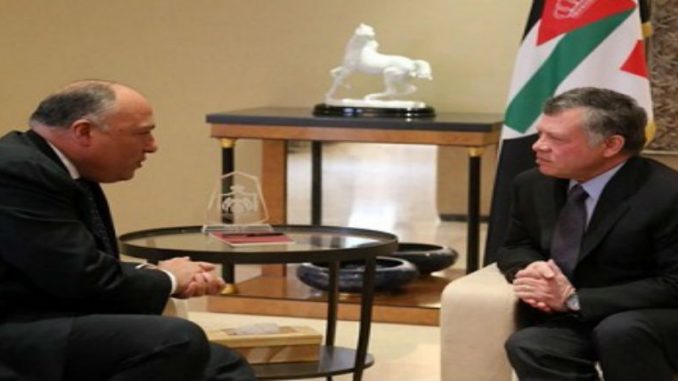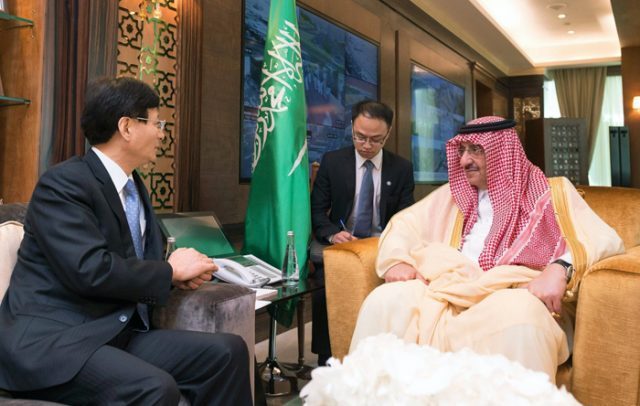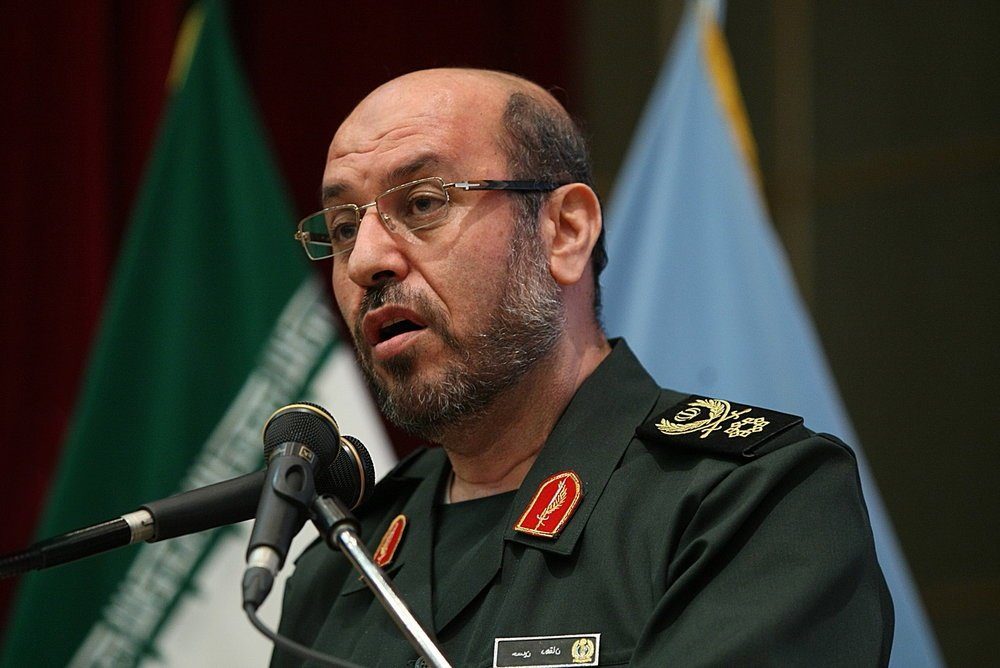
Egypt’s Minister of Foreign Affairs Sameh Shoukry visited Amman on Tuesday and met with Jordan’s King Abdullah II for bilateral talks. He also delivered a message from Abdel Fattah Al-Sisi to the Jordanian king.
Shoukry also met with his Jordanian counterpart Ayman Al-Safadi and Prime Minister Hany Mulki where they discussed bolstering bilateral relations in all fields to serve the interests of both countries, according to Egypt’s foreign ministry spokesman Ahmed Abu Zeid.
Discussing Regional Issues and Preparing for the Upcoming Arab Summit
Shoukry’s visit revolved around bilateral relations and the latest developments in the region, most notably the Palestinian issue and the latest developments in Syria, Iraq, and Yemen, as well as the ongoing preparations for the upcoming Arab summit to be hosted by Jordan in March.
In January, al-Sisi was officially invited by King Abdullah to attend the upcoming Arab League summit in Jordan in March.
The invitation was relayed by then-Jordanian Foreign Minister Nasser Judeh, who arrived in Cairo last month for talks with Abdel Fattah al-Sisi on bilateral ties and regional developments.
It is worth to mention that Jordan’s King Abdullah visited last month the United States of America where he met US President Donald Trump and his new administration.
Abduallah’ visit to Washington focused on range of issues from speeding up the fight against Islamic State, the crisis in Syria, and efforts to reach an agreement between Israelis and Palestinians, according to the White House.
Moreover, Jordan has just participated as an observer in a technical meeting in Kazakhstan’s capital Astana to discuss in detail the implementation of the Syrian ceasefire agreement.
In this context, it seems that Shoukry’s visit to Jordan at this timing is related to King Abdallah’s recent visit to Washington to issue the recent developments as well as Washington’s views regarding the Middle East region especially that the the Arab Summit is one its way next month.In addition to be also updated with the new Syrian developments in the light of Astana talks.
In fact, despite Moscow’s plan to invite Cairo to join the meetings of the three guarantor states -Turkey, Russia, and Iran- in Astana to resolve the Syrian crsis, but it was forced to call off the invitation after Ankara’s opposition.
The Egyptian-Turkish relations deteriorated after the military coup in 2013 led by General Abdel Fattah al-Sisi. The coup overthrew Egypt’s first democratically elected President Mohamed Morsi. Turkey provided support for the Muslim Brotherhood in Egypt and it doesn’t recognize al-Sisi military regime.
In this context, Egypt’s Foreign minister and his Jordanian counterpart discussed the Syrian conflict and its recent development.
FM Sameh Shoukry said “We are now about to engage in new peace talks which we hope will equally include all the national Syrian opposition groups, and these (talks) will put the country on the path towards ending this armed conflict and ending its devastating effects on Syrian people. His Jordanian counterpart, Ayman Safadi, said Jordan supported all efforts to end the Syrian conflict.
He said, “We saw the Astana (talks) as an attempt to ensure a ceasefire all around Syria, especially the south, and as a step that resumes peace talks led by the United Nations and attended by all relevant parties.”
Regarding the Palestinian issue, Egypt and Jordan reiterated their support for the Palestinian national cause, two days after Israel adopted a law legalizing thousands of settlement homes in the occupied West Bank.
The Jordanian Foreign Minister Ayman al-Safadi said in a joint press conference held with Egyptian counterpart Sameh Shoukry in Amman, “The Palestinian cause is a priority for all of us, “as reported by Anadolu News Agency.
Shoukry’s visit comes one day after the Knesset (Israel’s parliament) retroactively legalized a number of Jewish-only outposts built on Palestinian land in the West Bank -considered illegal under international law.
Al-Safadi said, “We condemn any unilateral action that undermines the two-state solution,” al-Safadi said. “Israeli Settlement building is an obstacle to efforts aimed at reviving peace.”
For his part, Shoukry said Cairo and Amman were working to “guarantee the legitimate rights of the Palestinian people, including the establishment of a Palestinian state”.
In fact, Jordan and Egypt are the only two Arab states which have full diplomatic relations with Israel.
The new Israeli legislation has drawn widespread criticism from Palestinians and the international community, who see it as threatening a “two-state solution” to the perennial Palestine-Israel dispute.
Will Al-Sisi be Delegated from Arab Countries to Speak with Iran regarding the Syrian crisis?
Al-Quds Al-Arabi (independent pan-Arab daily newspaper) has unveiled important details about FM Sameh Shoukry’s visit to Jordan pointing out that Shoukry has delivered message from al-Sisi to be delegated to from Arab countries to speak with Iran regarding the Syrian crisis.
According to the newspaper, this trial comes amid Jordan’s hosting to the upcoming Arab League summit next March.
Sources also said that during Shoukry’s meeting with his Jordanian counterpart Ayman al-Safadi, the latter stated that his country’s top priority is to “secure the borders” with Syria and from any foreign threat.
Al-Safadi also ruled the presence of any “direct contact” with Iran regarding the Syrian issue.
Jordan’s Minister of Foreign Affairs Ayman Safadi said that there is no direct contact between Jordan and Iran regarding safeguarding the northern borders, but the Kingdom is taking all necessary steps to protect its interests, as reported by the Jordan Times (Jordan’s independent) newspaper.
He added, “We do all that is necessary to achieve this goal, including our international efforts,” referring to the Geneva and Astana frameworks and Jordan’s coordination with other Arab countries.
Safadi stressed, however, that there “is no direct contact with Iran in this regard”, but that both Jordan and Iran attended the Astana meeting and that Jordan will do “whatever is necessary in order to protect our national interests and to safeguard our northern borders”.
However, al-Quds al-Arabi pointed that, “al- Safadi explicit statement is a message to Iran that the Egyptian friend for both Tehran and Damascus is attending instead. Moreover, this is a return to the old rules of the game as identified previously by chairman of the Joint Chiefs of Staff, Lt. Gen. Mahmoud Freihat during his popular interview with the BBC when he clarified to Damascus that his main problem is with the Iran and Hezbollah’s militias that try to come near south Daraa or try to control the international road separating between Amman and Damascus.”
It is worth to mention that the Jordanian institution deliberately insists not to communicate with Iran. In addition, Jordan always accuses Iran’s embassy in Amman that it tries to exceed the diplomatic norm; cause any public rapprochement with Tehran will have negative repercussions of Amman’s relations with Israel and Saudi Arabia, which are more important to the Jordanian Kingdom.
In this context, “When al-Safadi mentioned that there is no direct contact with Iran regarding Syria, he actually points that Cairo will carry out this contact instead,especially that Amman already has intense contact with Washington and Moscow. In addition, it has recently opened direct contacts with the Syrian regime with different languages and through different channels, one of them is the “security channel” within the framework of Syria’s security strongman Ali Mamlouk who visited Amman at least four times recently, but the visits weren’t announced publicly, “said al-Quds al-Arabi newspaper.
Al-Mamlouk was appointed chief of the Syrian National Security Bureau in 2012. He currently supervises all Syrian security apparatuses. Al-Mamlouk’s name is one of several Syrian names listed by imposed E.U. sanctions.
According to many politicians close to the Jordanian Prime Minister Hany al-Mulki’s office said, “There is no need to agitate Saudi Arabia’s dissent by activating communication channels with Iran regarding the Syrian issue.”
In fact, the Egyptian Saudi relations have recently strained as a result of al-Sisi’s divergent policies from the Kingdom in various regional issues-on top of them is the Syrian crisis.
Last October, Egypt voted in favor of the Russian resolution in the UN Security Council on Syria, which was opposed by Saudi Arabia.
As a result, Egypt’s stance has angered Egypt’s major Gulf backer which condemned Egypt’s vote and described it as a “painful” stance.
After the voting, the Saudi ambassador to the UN, Abdullah al-Mouallimi said, “It was painful that the Senegalese and Malaysian stance was closer to the Arab’s consensus than the Egyptian delegation.”
He also said that he feels pity for these countries that voted for the Russian resolution, stressing that his country will continue backing the Syrian people by all means.
Two days following the voting, Saudi state-owned oil company Aramco announced halting oil product supply to Egypt. The sudden halt, triggered a scornful media campaign against Saudi Arabia, as it was seen as a political decision. On the other side, Saudi journalists and media men criticized the Egyptian regime and blamed the kingdom or its financial generosity to the al-Sisi regime.
On the other hand, Al-Sisi got more involved in the Syrian issue but through the Russian Iranian axis.
Last October, a top Syrian intelligence official discussed security coordination with his Egyptian counterpart amid warming ties between the two countries.
Syria’s state news agency SANA reported then that Syrian National Security Bureau chief Ali Mamlouk “made an official visit to Cairo,” where he met with General Khaled Fawzy, the head of Egypt’s General Intelligence Service, as well as other “senior security officials.”
SANA said “The two sides agreed to coordinate political stances,” adding that they also decided to “strengthen coordination in the fight against terrorism.”
In August 2015 Mamlouk, who has served as a diplomatic troubleshooter for the Bashar al-Assad regime, previously traveled to Egypt in August 2015.
Moreover, Egypt has participated, based on an Iranian invitation, Lausanne peace talks in October 2016
Mekameleen TV Channel broadcasted a new batch of leaked audio phone calls for Egypt’s Foreign Minister Sameh Shoukry and al-Sisi regrading Syria Peace talks in the Swiss city of Lausanne.
Shoukry said in the leaked audio that John Kerry told him that Iran insisted on Egypt’s participation in the peace talks, “US Secretary of State John Kerry spoke to me about an hour and a half ago and proposed that I attend the Lausanne meeting,”
He added, “He told me clearly that Iranian Foreign Minister Jawad Zarif made it a condition that Egypt must attend.”
Egypt’s Foreign Minister told al-Sisi that he believes that, “the meeting will further complicate the relations with the Saudi Kingdom and that it’s better not to attend.” He also added, “Our participation has negative repercussions rather than positive ones.”
Shoukry added that Kerry had earlier excluded Egypt from the meeting, justifying the decision by saying that the talks were only for “parties that have military impact on the ground, and therefore they did not want to involve Egypt”.
Shoukry also said, “The invitation came after they initially decided not to invite us,” he added, “The Russians proposed inviting us but it was the Americans who initially objected. The Russians then did not insist.”
Egypt’s Foreign Minister said to al-Sisi that he thinks that Iran is taking advantage from the situation (he means the tensions in the Egyptian Saudi relations).
However, al-Sisi has accepted the invitation but he wanted Kerry to announce Egypt’s attendance in order not to uncover Iran’s insistence on Egypt’s participation.
Shoukry said he will “get Kerry to issue a statement in which he stresses that he extended the invitation. He continued, “We will also…issue a statement that I received the invitation from him.”
This new leak matches with the leaked emails revealed by the Guardian which showed that Iran had requested the lobbying for Egyptian officials to attend the talks on the Syrian crisis in Lausanne conference.
The Guardian said that it has seen emails indicating that the Iranian foreign minister, Mohammad Javad Zarif, asked Kerry for Cairo’s team to attend the Lausanne talks. When the US secretary of state proposed six-nation talks to “see if a new reasonableness can manifest itself” in Syria, Zarif replied: “Why not Egypt too?”
Iran agreed to attend the talks only once it had secured places for the foreign ministers of Egypt and Iraq at the discussions, according to the Guardian.



